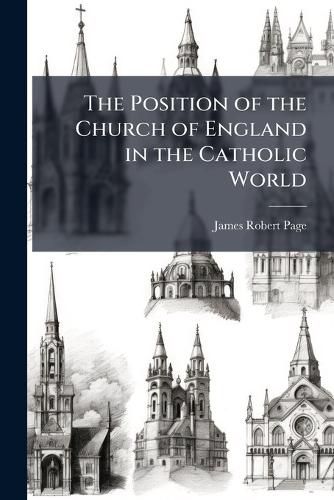Readings Newsletter
Become a Readings Member to make your shopping experience even easier.
Sign in or sign up for free!
You’re not far away from qualifying for FREE standard shipping within Australia
You’ve qualified for FREE standard shipping within Australia
The cart is loading…






"The Position of the Church of England in the Catholic World" by James Robert Page explores the theological and historical context of the Church of England in relation to the broader Catholic tradition. Inspired by a critical reading of Tract 90 from "Tracts for the Times", this work delves into the controversies and debates surrounding Anglican identity during the Oxford Movement. Page examines the nuanced relationship between the Church of England and Catholic doctrine, addressing questions of authority, continuity, and the nature of the Church. This book offers valuable insights into the theological landscape of 19th-century England and the ongoing quest to define Anglicanism within the wider Christian world. A vital resource for those interested in religious history and ecclesiastical studies.
This work has been selected by scholars as being culturally important, and is part of the knowledge base of civilization as we know it. This work was reproduced from the original artifact, and remains as true to the original work as possible. Therefore, you will see the original copyright references, library stamps (as most of these works have been housed in our most important libraries around the world), and other notations in the work.
This work is in the public domain in the United States of America, and possibly other nations. Within the United States, you may freely copy and distribute this work, as no entity (individual or corporate) has a copyright on the body of the work.
As a reproduction of a historical artifact, this work may contain missing or blurred pages, poor pictures, errant marks, etc. Scholars believe, and we concur, that this work is important enough to be preserved, reproduced, and made generally available to the public. We appreciate your support of the preservation process, and thank you for being an important part of keeping this knowledge alive and relevant.
$9.00 standard shipping within Australia
FREE standard shipping within Australia for orders over $100.00
Express & International shipping calculated at checkout
"The Position of the Church of England in the Catholic World" by James Robert Page explores the theological and historical context of the Church of England in relation to the broader Catholic tradition. Inspired by a critical reading of Tract 90 from "Tracts for the Times", this work delves into the controversies and debates surrounding Anglican identity during the Oxford Movement. Page examines the nuanced relationship between the Church of England and Catholic doctrine, addressing questions of authority, continuity, and the nature of the Church. This book offers valuable insights into the theological landscape of 19th-century England and the ongoing quest to define Anglicanism within the wider Christian world. A vital resource for those interested in religious history and ecclesiastical studies.
This work has been selected by scholars as being culturally important, and is part of the knowledge base of civilization as we know it. This work was reproduced from the original artifact, and remains as true to the original work as possible. Therefore, you will see the original copyright references, library stamps (as most of these works have been housed in our most important libraries around the world), and other notations in the work.
This work is in the public domain in the United States of America, and possibly other nations. Within the United States, you may freely copy and distribute this work, as no entity (individual or corporate) has a copyright on the body of the work.
As a reproduction of a historical artifact, this work may contain missing or blurred pages, poor pictures, errant marks, etc. Scholars believe, and we concur, that this work is important enough to be preserved, reproduced, and made generally available to the public. We appreciate your support of the preservation process, and thank you for being an important part of keeping this knowledge alive and relevant.